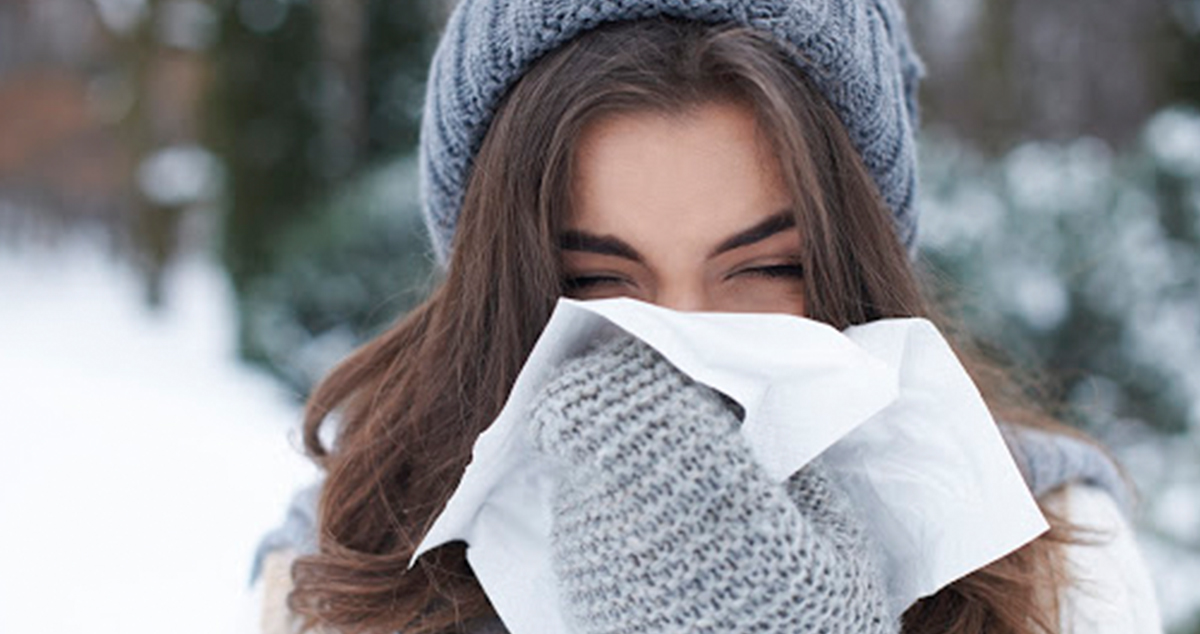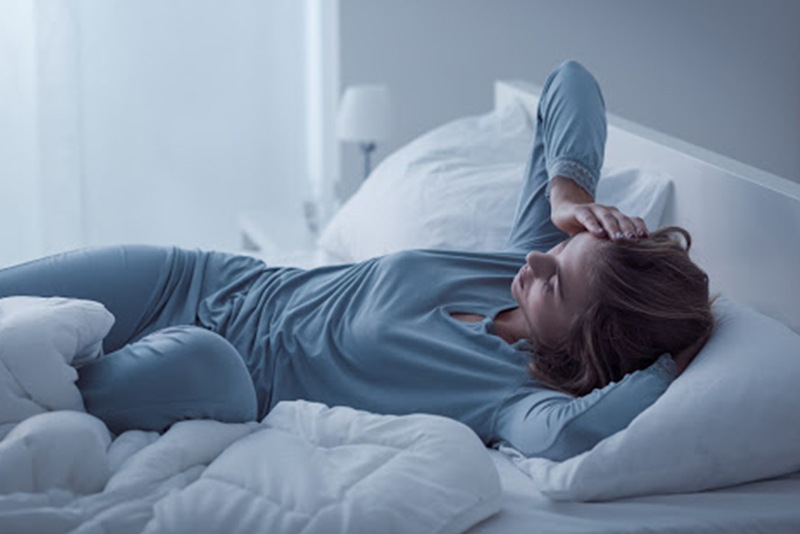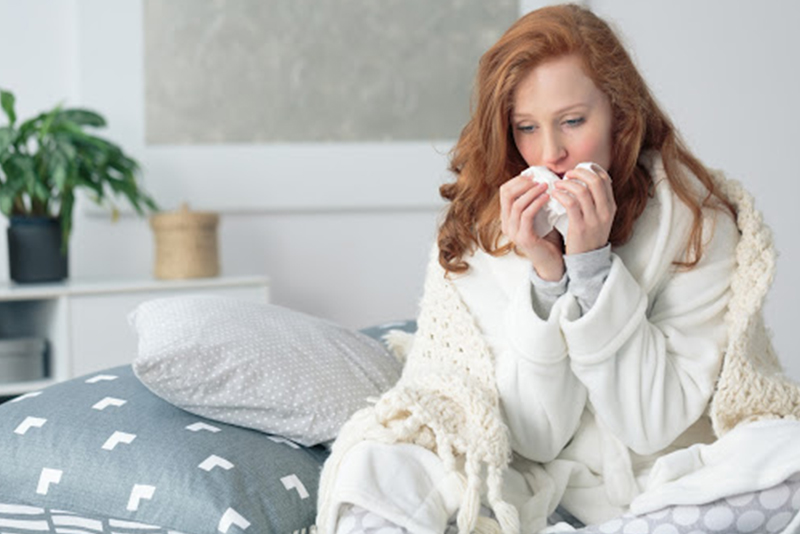How To Sleep With Stuffy Nose – You may be surprised to find out that a stuffy nose is not the result of congestion in your nasal passages. The difficulty you have breathing through your nose is likely caused by inflamed and irritated blood vessels in the sinuses. This irritation can be triggered by conditions such as the common cold, the flu, a sinus infection, non-allergic rhinitis, or nasal polyps [1]. Regardless of the cause, a stuffy nose can cause lack of sleep, daytime sleepiness and a general feeling of being blue. But with a couple lifestyle changes, you can get a good night’s sleep again.
The Cause Of Your Stuffy Nose Determines The Treatment
If you’ve got symptoms of a cold or some other infectious/viral condition, it’s pretty easy to determine why you’ve got a stuffy nose. However, if your nose is stuffy and you aren’t ill, you may want to seek a medical consult. Enlarged turbinates (nasal tissues inside the nasal cavity) can occur for many reasons including from allergies. Choanal atresia is a congenital disorder that can cause nasal stuffiness. Here, the back of the nasal passage is blocked causing a nasal obstruction due to a problem during fetal development. Should your child sound “nasally” or you find them snoring when they are not ill, you may want to see your pediatrician to ensure your child’s health.
How To Deal With A Stuffy Nose
You can try the following tips if you have cold symptoms or suffer from nasal stuffiness.
Stop blowing your nose
If you want to ease congestion from your nose, you’re probably thinking of grabbing some tissues to blow your nose. However, research shows that blowing your nose too frequently can cause excess pressure and inflammation in your nasal cavities thus causing nasal fluids to travel to your sinuses. Dab the nasal discharge coming from your runny nose instead. Or, if you really need to blow your nose, close one nostril at a time then blow gently to release any mucus buildup.
Keep hydrated
How to sleep with a stuffy nose? Make sure you’re hydrated. Drinking fluids can help loosen mucus causing congestion, draining the nasal passages and sinuses [2].
Nasal rinse
If you’re not getting a good night’s sleep as a result of nasal obstruction, you might want to do a nasal rinse. You can purchase a nasal rinse or neti pot kit to clear out the mucus in your nasal passages and ease congestion. To create your own nasal rinse, mix a teaspoon of baking soda and 3 teaspoons of iodide-free salt in a small container. Scoop a teaspoon of the mixed powder into a cup of distilled water, shake or just stir well, then use the mixture to rinse your nasal passages. Be sure to only use distilled water.
Add moisture to the air
Most of us turn on the heat during the winter to keep us warm but this can rob the air of moisture which can irritate your already congested nose. Breathing through your mouth may help you sleep but it can leave you with a sore throat the following day. Instead of mouth breathing at night, installing a humidifier in your bedroom will replenish moisture to the air and help you breathe easier especially if you have a cold or the flu [3].
Antihistamine helps
Congestion may be caused by allergens which can irritate your nasal tissues. If you suffer from allergies, you might want to take medications that can reduce histamine production.
Cool Mist Humidifier
A cool mist humidifier may be a welcome relief to your sinuses. The extra moisture from a humidifier can relieve sinus pressure, helping you breathe better.
Prop your head up
Another way to alleviate congestion for a good night’s sleep is to prop your head up. Add an extra pillow under your head so that it will be positioned above your heart to prevent the blood flow from pooling in your nose. When your head is lying flat on your back, the mucus can build up in your sinuses which can clog the nasal passages and disrupt your sleep [4].
Nasal strips
Nasal strips are typically used by those who have obstructive sleep apnea or suffer from periods of apnea. But you can also use this remedy when you are dealing with a cold. These strips help open your nasal passages in order to relieve congestion so that you can sleep better at night.
Take a hot shower
How to sleep with a stuffy nose? Take a hot shower before bed. The hot water spraying from the shower head can create steam which can help open your nasal passages and reduce the amount of mucus in your throat. A quick shower alternative is to boil water then transfer it into a bowl, cover your head with a towel, then inhale the steam coming from it.
Have some peppermint tea
The peppermint in the tea can loosen up mucus in your throat and nasal passages. If you manage to get your hands-on fresh peppermint, you can soak the stem in hot water and drink it warm to help relieve your stuffy nose [5].
Nasal decongestant
To ease congestion in your nose, throat and lungs, nasal decongestants can be helpful, but only in the short-term. Nasal sprays can open your nasal airways and alleviate the symptoms of your congestion, so you can fall asleep easily at night. For infants, a nasal aspirator can be used.
Adjust the thermostat in your bedroom
A cool environment can make your bedroom conducive for sleeping but if nasal stuffiness is preventing you from breathing easily at night, you might want to try raising the temperature. A slightly warmer sleep environment may ease the blockages in your nasal passages [6].
Gargle with salt water
Your throat can feel a bit sore if you experience nasal drip from your stuffy nose. One of the best ways to remedy this problem is to gargle salt water. This tried and tested home remedy can reduce inflammation in your throat and help loosen excess mucus.
Dust
Keep dust mites and other common allergens at bay by frequently dusting and changing the air filters in your furnace.
Nasal aspirator
As mentioned earlier, infants can use a nasal aspirator in place of nasal spray.
A Last Word About How To Sleep With Stuffy Nose
If you or someone in your family suffers from symptoms of a chronic stuffy nose or experiences mouth breathing or snoring, consider investing in an adjustable bed. Elevating the head of your bed can help reduce nasal pressure and drain sinuses. Nasal congestion makes it hard to get a restful night’s sleep which can lead to other conditions. A clinical study by the National Commission on Sleep Disorders Research found that both blood pressure and heart rate significantly increase after just one night of sleep deprivation [8].
How To Sleep With Stuffy Nose Resources:
[1] Health Line; How to Clear a Stuffy Nose.
[2] Health Line; How to Sleep with a Stuffy Nose: 25 Tips to Speed Healing and Sleep Better.
[3] WebMD; 6 Tips for Sound Sleep When You Have a Cold, Jodi Helmer, Melinda Ratini, DO, MS, November 12, 2015.
[4] Everyday Health; 8 Ways to Sleep Better With Sinus Pain and Congestion, Denise Mann, Judy Mouchawar, MD, MSPH.
[5] [6] Life Hack; How To Sleep With A stuffy Nose? A Complete Sleeping Routine To Save Your Night!, Amy Johnson.
[7] [8] Report of the National Commission on Sleep Disorders Research, U.S. Department of Health and Human Services, Vol. 2. p 84 (Washington DC,1994).





